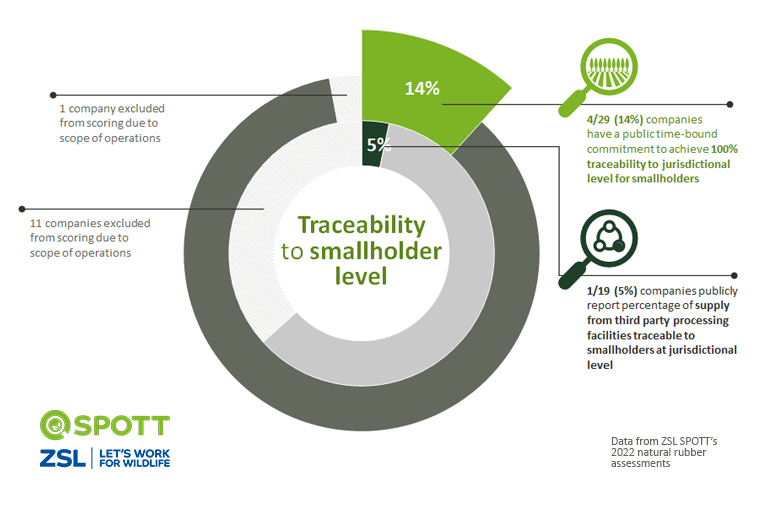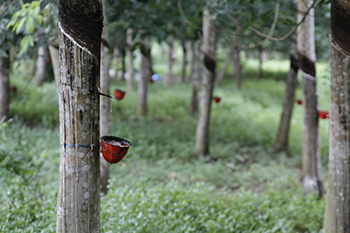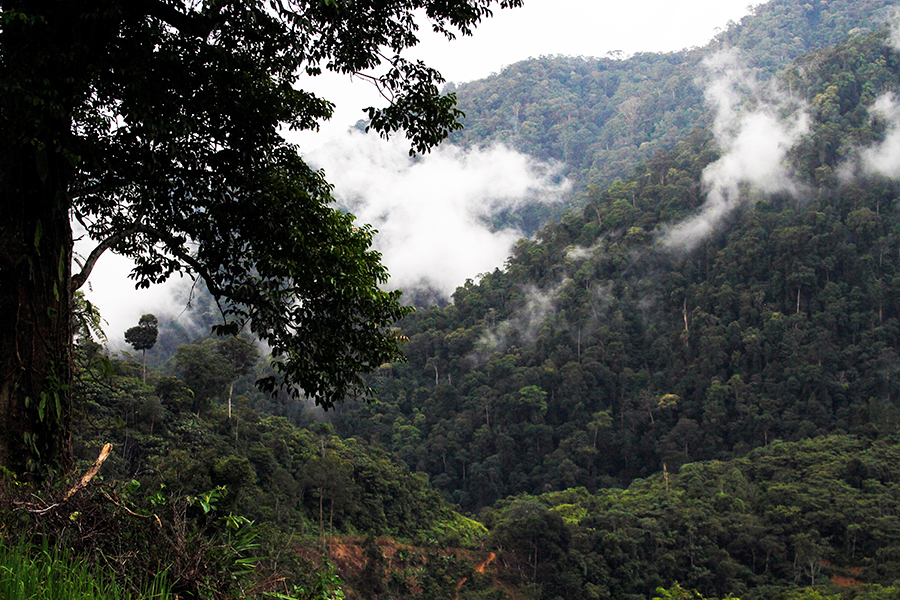Thirteen leading rubber manufacturers including Michelin, Pirelli and Top Glove, are ranked in a new assessment led by ZSL SPOTT. This analysis covers the companies’ public policies and commitments relating to environmental, social and governance (ESG) issues – a world-first for the rubber manufacturing industry.
The manufacturers were among 30 natural rubber companies, including producers and processors assessed by SPOTT’s team in research published today (2 March 2022) as part of ongoing efforts to encourage transparent supply chains and a greener and fairer future for rubber.
70% of the world’s natural rubber is bought and utilised for tyre production. The global demand for rubber, harvested from plantations of the rubber tree (Hevea brasiliensis), has led to more than five million hectares of deforestation in recent years.
ZSL’s research showed only 14% (4/29) of companies commit to trace all rubber sourced from smallholders (small scale farmers) back to its place of origin by a target year. Meanwhile, 5% (1/19) of manufacturers and traders publicly reported the percentage of their supply from third party processing facilities traceable to smallholders at the jurisdictional level.

This freely available data highlights a significant challenge for the sector – a lack of traceability of natural rubber from smallholders who produce around 85% of the world’s natural rubber. Smallholders can face exploitation and human rights violations in long, complex supply chains that are often hard to trace. This lack of visibility at the commodity’s source makes it nearly impossible for companies downstream to claim rubber is cultivated in a sustainable way.
Sam Ginger, ZSL’s lead analyst on the study, said: “Companies should move quickly to scale up efforts to map entire supply chains so sustainability commitments can be implemented from farm to factory.
“Rubber companies have a responsibility to ensure farmers who are vulnerable to fluctuating demands and market conditions are not exploited, and to protect the biodiverse ecosystems where they operate and source their rubber.”
Most rubber is harvested in southeast Asia, such as Thailand and Indonesia, with the Asian continent accounting for 85% of global production. Tropical regions, where natural rubber trees are grown, are home to a high diversity and abundance of animal and tree life, vital resources for local and indigenous communities. They also help maintain global climate stability.
The team’s research showed that 62% (18/29) of companies that source from smallholders had a clear public commitment to zero-deforestation applicable to all their suppliers, but just 10% (3/29) publicly reported some evidence of monitoring deforestation and/or ecosystem conversion in supplier operations. The study revealed that rubber manufacturers scored higher than producers and processors, with an average of 42% compared to 37%. Michelin, assessed as a producer, processor and manufacturer of natural rubber, scored highest of all with nearly 82%.
Amy Smith, sustainable natural rubber program director for forests at World Wildlife Fund (WWF) in the US, said: “The SPOTT data shows the rubber industry’s wide gap between policy and action. The company that produced your vehicle’s tires is likely unaware of the natural rubber’s origin or the impact of its production.
“New and upcoming legislation in the EU and US will require companies to know. They must understand where their natural rubber comes from and demonstrate it did not result in deforestation or human rights violations. WWF urges investors to take note and reward companies that are going the extra mile by tracing rubber from farm to factory and ensuring that production meets rigorous ESG criteria.”
Sam continued: “We recognise that companies are at different stages of their sustainability journey but hope that the participation of such high-profile brands will set a precedent for others working in the supply chain. We also strongly urge manufacturers to help their suppliers improve on their ESG transparency.”

Natural rubber plantation – Indonesia (Photo: David J Johnston, ZSL)
Companies who were members of the Global Platform for Sustainable Natural Rubber (GPSNR), a multi-stakeholder platform for natural rubber sustainability with over 150 members, scored higher in their transparency and public commitments than those that weren’t, with an average of just over 52%, compared to 25% for non-members.
Stefano Savi, director at GPSNR, said: “I am glad to see GPSNR members performing well, I think there is room for improvement, and it is good that GPSNR will have reporting requirements for members from this year, which will position GPSNR members well to achieve an even better score in next year’s report.”
Assessed companies are encouraged to work together with SPOTT analysts during the consultation period when they have an opportunity to improve their scores before ZSL publishes its results on the platform. This year, every company that engaged with ZSL improved its score by disclosing more information on its website during the assessment process.
Sam concluded “we would like to see more suppliers engaging with ZSL SPOTT and GPSNR to ensure public commitments are being made, implemented, and reported on across the whole supply chain. Working together would go some way towards a scenario where sustainable and equitable production of natural rubber can continue whilst enabling the recovery of wildlife within the landscapes it occupies.”
ZSL urges governments to ensure nature is part of wider policy decision-making. ZSL and partners are supporting improved due diligence processes for forest risk commodities in the UK Environment Act, and ZSL is calling for natural rubber to be included in EU legislation. Governments should prioritise biodiversity loss and recognise its interconnections with other environmental issues such as climate change. You can support ZSL global science and conservation work by donating at www.zsl.org

Rainforests in Southeast Asia (Photo: David J Johnston)
